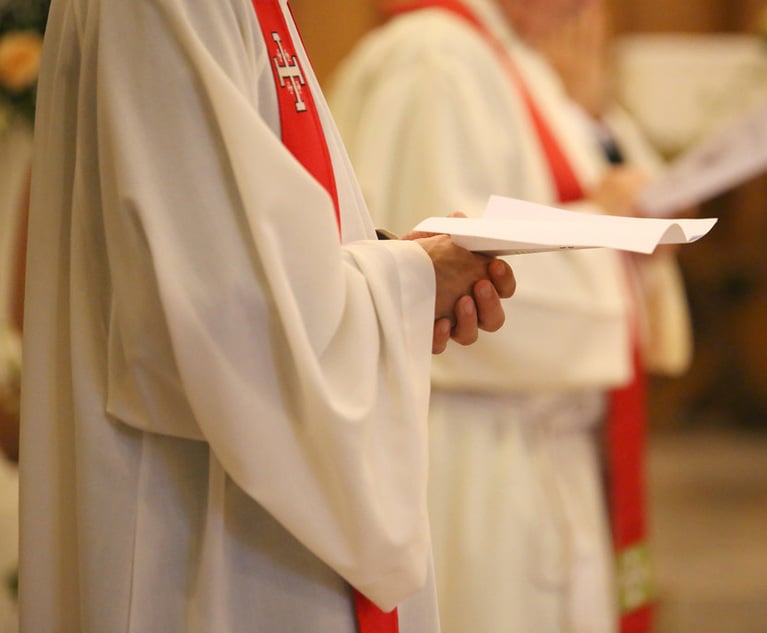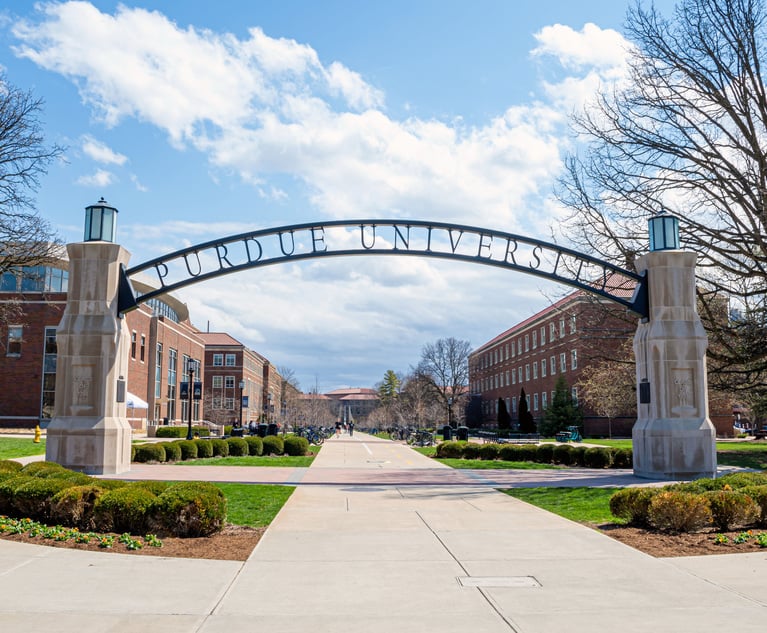Unprecedented: Massachusetts to Offer Its Own Online Bar Exam—If Necessary—Amid COVID-19
The state will offer a Massachusetts-only online bar exam in September if it's unsafe to deliver the traditional test—a first among jurisdictions.
April 24, 2020 at 11:39 AM
5 minute read
 John Adams Courthouse, home of the Supreme Court of Massachusetts. (Photo: Wikipedia)
John Adams Courthouse, home of the Supreme Court of Massachusetts. (Photo: Wikipedia)
Massachusetts will create and deliver its own online bar exam if it's unsafe to administer the traditional test in late September—the rescheduled date for the July exam.
The Massachusetts Supreme Judicial Court and the Massachusetts Board of Bar Examiners unveiled those plans Thursday, making it the first jurisdiction to commit to an online test as a fallback amid the COVID-19 outbreak.
The National Conference of Bar Examiners, which develops the traditional bar exam, has said it's examining whether its test can be administered remotely. Conference president Judith Gundersen said Friday that there are "significant issues" with delivering a two-day, high-stakes exam remotely, including security.
"We remain committed to assisting the [Massachusetts] court and the board by providing exam materials should the court determine that it's safe to go forward with an administration of the Uniform Bar Exam in the fall," Gundersen said. "We understand that any alternative exam developed by the [Massachusetts Board of Bar Examiners] would allow local admission only."
The steps Massachusetts is taking demonstrate the complications that the pandemic has created in the ability of upcoming law graduates to become licensed. Other jurisdictions are grappling with the issue and are weighing a variety of options.
The Massachusetts Supreme Judicial Court offered few details of what an online bar exam would look like, but stipulated that such a test would enable admission only in Massachusetts. By contrast, the Uniform Bar Exam, which Massachusetts uses under normal circumstances, paves the way for admissions to more than 30 other jurisdictions. But committing to an online test—even one limiting takers to admission in one state—is meant to offer some certainty to graduating law students who fear the July bar exam will be postponed repeatedly if the pandemic stretches on.
"We understand that this is a terrible time to graduate from law school, given the likelihood of a deep recession (or worse), the uncertainties as to how and when the pandemic will end, and the challenges of practicing law, training new lawyers, and conducting justice virtually," wrote Chief Justice Ralph Gants in a Wednesday letter to the state's law deans. "The Justices and the [Board of Bar Examiners] will continue to work closely with you to attempt to diminish the impact of the pandemic on recent law graduates, consistent with our obligations regarding the practice of law and the protection of the public."
Jurisdictions are taking various approaches to the July bar exam. Many—mostly in smaller or more rural states—have said they still intend to administer the exam on the planned July 28 and 29 date. Others, including Massachusetts, New York and Georgia, have said they will offer the exam on one of two new dates added by the national conference, on Sept. 9 and 10 or Sept. 30 and Oct. 1.
A growing number have also extended supervised practice provisions that allow law students to practice under the supervision of a licensed attorney. And Utah this week became the first jurisdiction to adopt an emergency diploma privilege that will enable law graduates to be admitted to the state bar with taking the bar exam, provided they perform 360 hours of supervised legal work by year's end.
The Massachusetts Supreme Court ultimately decided against an emergency diploma privilege or an extended supervised practice program because the state's first-time pass rate has hovered around 81% for the past three years, Gants wrote. That would likely mean that roughly one out of every five new lawyers might start practicing under supervision, then lose their privilege to practice if they must later take the bar, he wrote.
"Not only would this raise justifiable concerns about their competence to practice law when they were doing so, but it also would create the problem of nascent law practices having suddenly to close shop, potentially leaving clients in the lurch," reads Gants' letter.
Moreover, it's not clear how closely licensed attorneys will be able to supervise the work of new law graduates, given that such arrangements are likely to be virtual, he added.
Massachusetts was among the first states to announce that it would not hold the bar exam in July. It has moved the test to the Sept. 30-Oct. 1 date, and has asked law schools to assist with extra space and staffing for that test—indicating that plans call for a more disbursed or socially distanced examination than usual.
Regardless of whether the state offers the Uniform Bar Exam or a Massachusetts-only online test, the Massachusetts Board of Bar Examiners will expedite grading and character and fitness reviews, so candidates know by mid-December whether they will be admitted, according to Gants' letter.
NOT FOR REPRINT
© 2025 ALM Global, LLC, All Rights Reserved. Request academic re-use from www.copyright.com. All other uses, submit a request to [email protected]. For more information visit Asset & Logo Licensing.
You Might Like
View All
Librarian's Termination Violated First Amendment Protections, Lawsuit Claims
3 minute read
Divided State Supreme Court Clears the Way for Child Sexual Abuse Cases Against Church, Schools

Longtime Purdue GC Accused of Drunken Driving Hires Big-Name Defense Attorney
3 minute read
LSU General Counsel Quits Amid Fracas Over First Amendment Rights of Law Professor
7 minute readTrending Stories
Who Got The Work
J. Brugh Lower of Gibbons has entered an appearance for industrial equipment supplier Devco Corporation in a pending trademark infringement lawsuit. The suit, accusing the defendant of selling knock-off Graco products, was filed Dec. 18 in New Jersey District Court by Rivkin Radler on behalf of Graco Inc. and Graco Minnesota. The case, assigned to U.S. District Judge Zahid N. Quraishi, is 3:24-cv-11294, Graco Inc. et al v. Devco Corporation.
Who Got The Work
Rebecca Maller-Stein and Kent A. Yalowitz of Arnold & Porter Kaye Scholer have entered their appearances for Hanaco Venture Capital and its executives, Lior Prosor and David Frankel, in a pending securities lawsuit. The action, filed on Dec. 24 in New York Southern District Court by Zell, Aron & Co. on behalf of Goldeneye Advisors, accuses the defendants of negligently and fraudulently managing the plaintiff's $1 million investment. The case, assigned to U.S. District Judge Vernon S. Broderick, is 1:24-cv-09918, Goldeneye Advisors, LLC v. Hanaco Venture Capital, Ltd. et al.
Who Got The Work
Attorneys from A&O Shearman has stepped in as defense counsel for Toronto-Dominion Bank and other defendants in a pending securities class action. The suit, filed Dec. 11 in New York Southern District Court by Bleichmar Fonti & Auld, accuses the defendants of concealing the bank's 'pervasive' deficiencies in regards to its compliance with the Bank Secrecy Act and the quality of its anti-money laundering controls. The case, assigned to U.S. District Judge Arun Subramanian, is 1:24-cv-09445, Gonzalez v. The Toronto-Dominion Bank et al.
Who Got The Work
Crown Castle International, a Pennsylvania company providing shared communications infrastructure, has turned to Luke D. Wolf of Gordon Rees Scully Mansukhani to fend off a pending breach-of-contract lawsuit. The court action, filed Nov. 25 in Michigan Eastern District Court by Hooper Hathaway PC on behalf of The Town Residences LLC, accuses Crown Castle of failing to transfer approximately $30,000 in utility payments from T-Mobile in breach of a roof-top lease and assignment agreement. The case, assigned to U.S. District Judge Susan K. Declercq, is 2:24-cv-13131, The Town Residences LLC v. T-Mobile US, Inc. et al.
Who Got The Work
Wilfred P. Coronato and Daniel M. Schwartz of McCarter & English have stepped in as defense counsel to Electrolux Home Products Inc. in a pending product liability lawsuit. The court action, filed Nov. 26 in New York Eastern District Court by Poulos Lopiccolo PC and Nagel Rice LLP on behalf of David Stern, alleges that the defendant's refrigerators’ drawers and shelving repeatedly break and fall apart within months after purchase. The case, assigned to U.S. District Judge Joan M. Azrack, is 2:24-cv-08204, Stern v. Electrolux Home Products, Inc.
Featured Firms
Law Offices of Gary Martin Hays & Associates, P.C.
(470) 294-1674
Law Offices of Mark E. Salomone
(857) 444-6468
Smith & Hassler
(713) 739-1250








